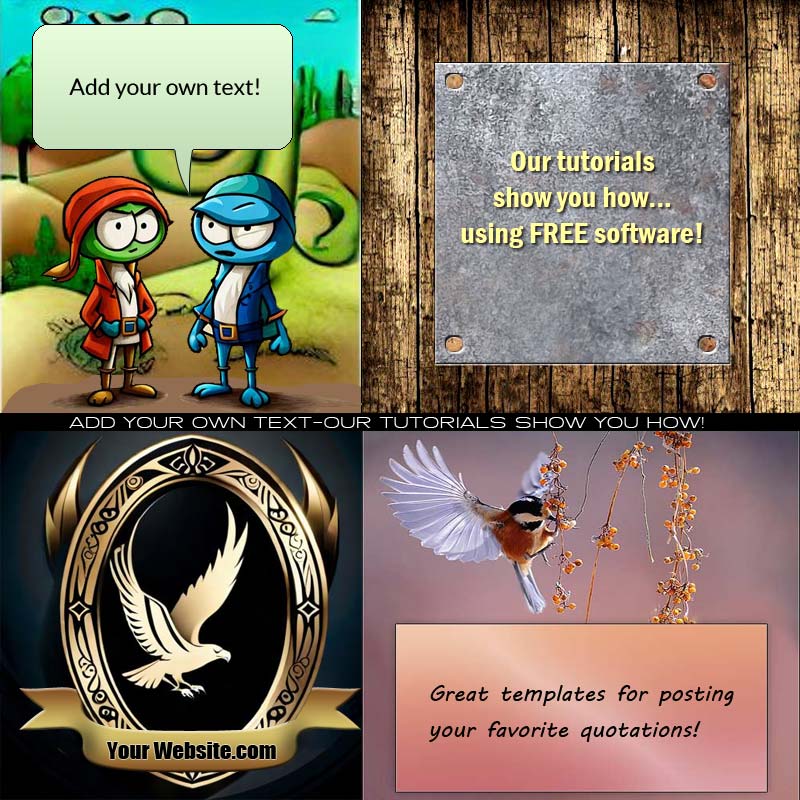Nothing is for sale here. Freewill tips keep the site running. Want to help? → Tip via Paypal
How to Build Authority Status
One dictionary definition of "authority" is the power to influence others. Authority status is given to those presumed to have extensive or specialized knowledge on a subject. Even if you do everything listed below, you're not likely to enjoy authority status if you lack a decent measure of expertise in your field.
As an online business owner, building authority can have a significant impact on your success. It not only motivates purchases, it also allows you to charge more for your products or services and attracts opportunities you may not have had otherwise. Having a college textbook publisher ask me to write a book for his company is a real life example of an unexpected opportunity.
Ask yourself this: If you wanted to be high school football coach, whose advice would you trust more, an NFL coach or a the guy watching the game at the corner bar? The answer is obvious. It's the same for people looking for products, services, or expertise in your field—all else being equal, they'd prefer buying or getting advice from an authority.
You don't have to be be well-known to have authority status. In fact, many business owners are quite skilled at positioning themselves as authorities. And you can, too.
This article is dedicated to helping you grow your position as an authority in your niche. We'll walk you through 12 steps to elevate your position from an unknown to a rising leader in your niche.
Some of the steps are easy. Others will take time, attention, and deliberate planning. No one becomes a recognized expert overnight. Use this information to create a plan. Set goals and track and measure your results. Your bottom line and your business will thank you.
Let's get started.
1. Always Present Yourself in a Professional Manner
No one is going to give you authority status unless you own it through consistency in word and deed. That means presenting yourself professionally at all times. As has been said many times, the Internet is forever. What is meant by that, is that something you said years ago could come back to haunt you today or 10 years from now. Even if you delete it, it could still be in the Internet Archives and accessible to the public.That means you need to wise about…
- Social media. Make sure your social media posts are professional. Even if you have a personal profile, you still want to maintain a professional image. It's a small world and you can bet that, as you grow, many of your business followers will find your personal page. Make sure to use family-friendly language and don't overshare personal details or strong opinions. If you wouldn't want a customer to know it, don't share it.
- The language you use. Whether you're responding to an email or talking on the phone, it's important to use respectful language. To be clear, that means no profanity and minimal slang. You want to communicate clearly. You needn't be the most eloquent person around, but you also don't want to be sloppy with your language.
- Your photos and images. Any photo that you share online or include in your marketing materials should portray you in a professional light. That doesn't mean you must wear a suit and tie, it just means you should be dressed appropriately for the situation being portrayed.
- Choose what you comment about wisely. Avoid controversial topics such as politics and religion. No matter which side you identify with, there will be many who identify with the other side, and many of them won't do business with you if they see you as having the "wrong" values.
-
Show respect for everyone. Refrain from using insults, even if you are insulted first. If you make any kind of name for yourself, or even if you don't, there are plenty of people so unhappy with themselves or their situation that they will lash out at anything that trips their hair-trigger temper. Remember, unjust criticism says more about them than you. Be the bigger person as much as possible.
Try to view personal insults as a third party observer. You can react, or respond. If you have a reaction to medication, it has an adverse effect on you. If you respond to medication, it has a positive effect on you. In these days of hyper-criticism and viral social media, your decision to react or respond can make all the difference in the world.
To be clear, reacting is to lash back at the offender. Responding is being the bigger person and trying to make the situation better—which is sometimes best accomplished by not responding at all. More on this shortly. - Be friendly. Introduce yourself to people, whether in person or online. Take the first step in getting to know others in your niche. Make connections and look for ways to help others because many will reciprocate. Put yourself in situations where you can learn, grow, and meet new people.
- Be a listener. We have two ears and one mouth—maybe we should listen twice as much as we talk! One of the easiest ways to have people like you is to get them talking about themselves. Ask questions and show genuine interest in them.
2. Why It's Important to Be Honest, Real, and Humble
There are two types of authority figures. There are those who may hit it big for a while before their fame and fortune burns out. We'll call them the "shooting star" authority figures.The other type is someone who builds a lasting authority over time. They are respected in their industry for as long as they choose to remain active, and often well beyond.
There are many things that separate a shooting star from a ongoing authority. Two of the primary differences are authenticity and transparency. These two words have been marketing buzzwords for a while now. What they mean, however, and what they provide, will never go out of style.
3. The Meaning of Authenticity and Transparency
In the case of establishing yourself as an authority figure in your niche, authenticity and transparency are major assets.-
Authenticity: Authenticity involves presenting yourself consistently across various platforms, such as social media, your website, in interviews, and in written content. Authenticity in building authority status is about being true to yourself and establishing a strong and genuine presence that resonates with others, leading to increased influence, impact, and recognition within a chosen field.
- Transparency: Transparency means that you are honest about who you are and what you know (that doesn't you must reveal everything, especially regarding controversial topics). Transparent authority figures are okay with telling people when they don't know the answer. They don't need to know everything. However, many authorities are passionate about their industry and will quickly dig up knowledge when they don't know the answer.
There are more benefits and opportunities available to you when you're being true to yourself. You'll make genuine connections with people, and that can bring new opportunities to you. You'll recognize opportunities you can pursue that fit who you are when you are actually being yourself. These natural fits lead to success.
Next, we'll take a look at how you can use criticism and negative feedback to turn negative feedback into a positive that actually helps build your authority.
4. Turn Criticism into a Positive
Everyone receives criticism. Even the smartest, coolest, most on-the-ball and most dag-gone wonderful people in the world (like me! ) get negative feedback.
) get negative feedback.
In fact, if you don't get any negative feedback or criticism then maybe you're too cautious. Maybe you're not taking enough risks, or never try anything new. In any case, you can turn negative feedback into a positive with a few savvy steps:
- Monitor your brand. Make sure that you know what people are saying about your brand. That means monitoring social media and setting up alerts so you know when people comment about you online. Google Alerts is free, but there are other alert services that work better if you look around.
- Does it deserve a response? Not all criticism deserves a response. Sometimes people just complain about petty things to have something to do. Other people are just looking for a fight. Don't take the bait. However, if a critical comment is valid, or it's an issue that can be resolved, take immediate action.
- Extend a hand. When someone makes a complaint or leaves negative feedback you can quickly begin to change the situation by reaching out personally to them. Introduce yourself, empathize or apologize, and give them a next step to take. This next step may be to contact you personally or to offer a solution to their problem.
- Be professional and interested in a resolution. If you keep the conversation on a public platform such as social media or a forum, then you can resolve the issue in front of your audience and the world. It's an opportunity to be of service and to help someone, and an opportune time to demonstrate your conviction to customer care. This will also help establish your authority and build your brand.
5. Make Use of Industry Specific Networking
We attribute credibility and authority to those who are associated with other credible experts. It's the opposite of guilt by association, it's credibility by association. It's a very real phenomenon that you can capitalize on by networking with others in your industry and in complementary industries and niches.
Potential opportunities abound, for example:
- By forging JV partnerships
- By networking within your niche
- By networking in complementary niches
- By guest posting on authority blogs, websites, and in newsletters
- By inviting experts to guest blog on your site
- By submitting content to industry magazines and publications
- By interviewing authors (especially those with a new book, they want publicity)
- By interviewing credentialed individuals
- By issuing press releases online
- By sending press releases to local media outlets (newspapers, radio, TV)
- By interviewing famous and near-famous people
Think you can't interview someone famous or important? I've interviewed movie producer Bobby Logan, book authors, an ESPN personality and others. You never know who will respond until you try! Seriously.
That list just scratches the surface, keep your eyes and mind open to possibilities and you'll see them! Sometimes it's what you know, sometimes it's who you know, and sometimes it who dare reach out to that can make a difference.
And if you're worried about "using" people to help build your authority and your business, don't. You can make it worth their while in numerous ways so that it's mutually beneficial. Besides, you'll be able to pay it forward when you achieve authority status by helping others on their path toward their goals.
Part of establishing credibility by association is getting press and publicity for your interactions with these other people. Next, we'll talk about public portfolios and using the press to help build your authority.
6. Public Portfolios and Press Releases
It takes more than simply being an authority to establish yourself as one. You actually have to make sure that other people know you're an expert in your industry. However, it's not kindly looked upon to simply tell people you're an expert. That's commonly viewed as bragging.What you can do, however, is use public information sites and services as a tool to help spread the word. Let's take a look at two relatively simple to use public tools – public portfolios and press releases.
What Is a Public Portfolio?
A public portfolio is what it sounds like; it's making your portfolio public. There are a number of ways that you can do this. You can create a LinkedIn account, for example, and upload your resume or CV and your portfolio on LinkedIn. You can then create a link to the information on your blog or website, or you can put up a portfolio page on your website or blog and link to it from LinkedIn and other social media sites.
And, depending on your specialty, there are often industry-related associations or portfolio sites where you can upload your relevant experience and history. For example, a writer can upload their writing history and samples on industry writing association websites, membership sites, and even on freelance job sites.
It's about making your work history, experience, and knowledge public.
What about Press Releases?
You have another opportunity to publicly share your authority status, without bragging, by issuing press releases. Each press release you issue needs to be newsworthy and have a goal and real information. However, it will also have what's called a "boilerplate," which is a short paragraph that explains who you are and why it matters.
Press releases are formal documents with a specific structure. They can be used to build authority because they include news and quotes from you or your customers. Additionally, when the press release is picked up by other agencies, it helps establish you as an expert.
Both portfolio sites and press releases provide you with an opportunity to share your knowledge without appearing like you're bragging or asking for attention. They position you as an expert by sharing your experience in a structured format.
There are websites where you can issue press releases for free, but the better press release services require a fee. The list time I issued a press release it cost around $200, but I got over 2,000 links to my website from it. It's one of the ways I built traffic up to well over one million visitors per year. Money well spent. [ traffic stats from before I retired ]
Next, let's talk a little about networking with your audience and how to make that work for you.
7. Network Where Your Target Market Hangs Out
Where do your customers and prospects hang out? Different demographics have different preferences. For example, you'll find an abundance of middle-aged folks hanging out on Facebook, women on Pinterest, millennials on Instagram, and even younger folks on Tumblr.And don't forget forums. Many, if not most niches, have at least a few very active forums.
Determine where your audience hangs out and go there. Network with your target market. Ask them questions. Answer their questions and really get to know your target market.
Once you befriend them you can begin to capitalize on your connections in a number of authority-generating ways.
- Be a problem solver. Many times business owners or their representatives just post what their announcements. They don't connect or interact with others through comments and discussions, or offer solutions to problems their target market has. Or if they do offer solutions to a problem, the solution is found at their website, on a sales page. You'll build better credibility if you genuinely solve problems – even if your solution doesn't generate a sale for you. Believe me, the good will you build can be a boon to your business in the long term.
- Be a connector. You can connect people who can help one another. For example, if you're a personal trainer you may have two clients who would benefit from an accountability partner. Get their permission to share their contact details and hook them up. Or, you may be writer and know and aspiring writer that needs an editor. Recommend one that you trust.
- Be a listener. Your audience can tell you what topics they want to know more about. Be responsive and create the content that satisfies their needs and desires.
- Be a learner. Your audience has a lot to teach you if you're willing to learn from them. Engage in conversations and ask questions. Show them that you care and assimilate the information you learn into your content.
Be sure to respond to comments you get in emails, on forums where you post, and on your blog if you have one. I know from my own Inbox that there are many who are frustrated with the lack of responses when they try to connect with other website owners. Exceptional customer service is still valued highly.
Finally, be sure to follow and participate in conversations on other blogs in your niche. When you are present where your audience hangs out, you'll begin to build a connection with them. That's powerful authority building and business-boosting access.
8. Building Authority Is about ‘Preselling' Yourself
Good affiliate marketers are very familiar with the concept of preselling. They spend time crafting informative and value-driven content designed to ultimately drive traffic to the websites of the products or services they are promoting. Of course, they do so in hopes of earning a commission.The foundation of preselling is to provide value to your audience. And there are, as you probably know, many different types of value. For example, entertainment has value. If you make someone laugh, and that's what they were looking for, then you've provided value.
Service providers can provide value in their content by helping their audience solve their problems. For example, a website designer might provide value by creating content that shares the elements of successful website design. They might offer how-to advice, and write about plugins, design languages, colors and more.
A product provider can provide value by creating content that also solves problems. For example, a home organization store has an endless amount of valuable content if they talk about how to organize, offer tips, tactics, and suggestions.
Providing this type of value can helps build your credibility. As you create value-driven content, you're sharing what you know, solving problems, and educating your audience. Preselling a product or service means creating content to increase public awareness for the product or service. Preselling yourself means to increase awareness about you or your business by creating content and helping solve problems. It all works together.
Positioning yourself as a credible and knowledgeable source of information builds trust with your prospects, and we tend to buy from people we trust and consider to be experts.
As a product or service based business owner, you presell yourself by positioning yourself as a source of information and knowledge. Content is the foundation of preselling yourself and building authority. Let's take a closer look at the role of content to build your authority.
9. Using Content to Build Your Authority
Content is one of the best tools, if not the best tool, you have to consistently and creatively build your authority. One blog post can reach thousands of people and help establish you as a credible expert in your niche. There are also an abundance of opportunities to create, share, and publish authority-boosting content.Let's take a look at the options.
- Create website and/or blog content. Whether you have a website or blog, regularly create top quality content to share. Share what you know, answer questions, talk about industry news, educate and provide solutions for your audience. Blog as often as you can while controlling for quality and value. This not only builds your authority with people, but with the search engines.
-
Guest blog/guest author. Find reputable industry blogs and websites and reach out to the site owner to offer them value-driven content you create. Include a byline with a call to action and a bit about yourself so readers will click through and visit your blog or website.
Make sure the blogs and websites you guest post on have a good reputation (or at least not a bad one) and are players in your niche or a complementary niche. Your reputation and authority will be enhanced by association. Do make sure it's a relevant and complementary niche. A dog trainer isn't going to reach the right target market by posting on a music blog, for example. - Create a useful email newsletter. Establish an email newsletter and build your list. Make sure that each issue of your newsletter, whether it's delivered weekly, bi-weekly, or even monthly, contains authority-building content. Invite your subscribers to share the newsletter with friends and also consider allowing them to reprint the content on their own blog or website (with attribution, of course).
- Consider other forms of content. We've talked about print content but there are many other formats to consider. You might create a video channel and share weekly videos. You can podcast or create infographics. Exploring other types of content will help you establish your credibility with an even larger audience.
- Publish a book. Digital publishing has never been easier. Don't wait any longer to take advantage of this opportunity. Start brainstorming book ideas, choose one, and start writing it. If you just don't have time to write it, create your outline and then hire a ghostwriter to do the legwork for you. You don't need a publisher. You can self-publish via Amazon's CreateSpace.com, LuLu.com, or other POD (print on demand) services.
- Blog comments. Your comments on your blog and on other industry blogs are an opportunity to create quality short-form content. Make sure anything you say in a comment is something that you'd be proud to publish. Make sure it positions you as an authority and represents you in a positive way.
- Use social media. Social media provides an abundance of opportunity to create and share content. You can share facts, links, and tips on Twitter and you can share brand new content on Facebook and LinkedIn.
-
Hold live events. I know some folks won't be comfortable with this, but consider holding live events like webinars, seminars, or live Skype question and answer sessions to provide information to people who are interested in learning more. These live events work much like a published book to establish you as an authority.
We naturally give authority to people who are published and to people who "teach" and speak in public. Hold an event and provide value to your listeners and you'll take huge steps in creating your authority status. - Create an information product. Beyond publishing a book you can also create home study courses. These courses can be delivered online via an autoresponder, as a direct download, or via a members-only site. You can also create a physical product that you can ship to their home.
- Produce white papers and case studies. These are more formal documents that you can create. These papers can be made available on your blog or website as downloads. You can also share them with your prospects as a tool to help solve their problems.
One way to both strengthen your content and further position yourself as an expert is to make sure that your content is well written. That means that it's conversational but also informative.
Your personality can play a role in the connections you make with your target market. We'll talk about integrating your personality into your brand, content, and communications with your prospects and customers next. You can be likeable and authoritative!
10. How to Leverage Your Personality to Build Authority
Your personality is part of your brand. As you communicate with your audience in conversation and with your marketing tactics, if you allow your personality to come through it can help brand your business and build your authority.We've talked about sharing your voice in your content and how that can help build your authority. There are other tools and tactics that you can leverage to showcase your personality as well.
Your Photo
A professional quality headshot or photograph of you can, and depending on your industry, often should be used on your website and marketing materials. Using your own image (instead of a cartoon or an icon) helps people connect with you as a person and an authority figure.
When you create information products, such as a free report or home study course, you can create a digital cover template that includes your photo. This helps create consistency with your brand and it helps build your personal authority when you're part of the brand image.
People respond to faces with a underlying emotional connection. If your photo makes you appear like the professional industry authority that you are, you'll help build that image with your audience.
Just make sure the photo is professional quality. By that I don't mean it has to be taken by a professional photographer. It should, however, portray you in a positive and appropriate light. A picture of you in a ratty t-shirt and swigging a beer isn't going to cut it in most niches.
Audio and Video
There are an abundance of opportunities to market with audio and video. You can create video content and share it on your website or blog and on video sharing sites. You can also create audio podcasts and publish them on podcast sharing sites.
Another way to use audio or video is to create welcome messages on your blog or website. Greet your visitors with a short, thirty seconds or less, message. This helps new visitors immediately connect with you and it gives a personal touch to your business. This isn't done often, which is why it can be an effective tactic with the right message.
Both audio and video can be powerful tools to help you leverage your personality and authenticity. As you consider your marketing and content efforts, look for opportunities to share your personality. Your writing style, your voice, and your image can all be used to help boost your authority and build your business.
11. Send a Consistent Message
It's important to send a consistent message. Sending mixed signals makes it harder for others to trust you because they don't know who you really are. Here's a real life example:I started following a certain copywriter on Facebook when I became aware of him. At first he posted some useful content and positive messages. It didn't take long, however, before he started posting derisive, cutting remarks about people. After a while it became apparent that this person couldn't stand anyone who didn't share his perspective on issues.
So on one hand, he could be friendly and helpful. Yet, he could spin around in an instant and post nasty, vile comments about people that challenged or even just questioned his opinion. Those inconsistencies revealed an uneven, turbulent personality that has cost him a lot of followers, including me.
Hopefully that illustrates how an inconsistent message can be self-defeating.
Finally, let's be honest and say that few will believe you're an authority if you don't believe it yourself. Let's wrap this up by talking about how you can begin to feel like an authority figure and exude confidence in your knowledge assets.
12. Be a Leader, Not a Follower
Do you believe that you're an authority in your niche? Do you feel like you have valuable experience, knowledge, and information to share with your audience? Can you impact the lives of others and help them solve their problems?If you answered anything but a resounding "Yes!" then your confidence may need a little work. If you want others to view you as an expert, it helps if you believe it yourself. It may help you to know that anyone with a moderately lower skill or knowledge level may view you as an expert—even if you don't currently see yourself that way!
- Read, learn, master. Create a strategy that supports you to consistently learn and stay at the top of your field. Learning helps you feel more confident in your existing knowledge and gain new knowledge and self-assurance.
- Network and listen. Reach out and connect with others. Networking gives you an opportunity to listen to other people. Ask questions and listen to the answers. You'll uncover opportunities to help others, and as you begin to realize the satisfaction in doing just that, your confidence will soar.
- Educate. Create information products, publish books, articles, and online learning materials. As you begin sharing your knowledge and experience, you'll receive positive feedback from others. This feedback will help you realize that you really do know what you're talking about. It's a great confidence booster.
As you learn more about your limits, you may be surprised that you're capable of much more than you think. You are an authority and once you believe it, you'll be in a better position to share and communicate your experience and knowledge to others.
Having said that, I want you to realize you don't have to be the most knowledgeable person in a given field to be considered an expert. An expert is just someone who knows a fair bit more than the average person. You don't have to know everything about a topic to be considered an expert or to help others.
You now have 12 steps you can use to go from a virtually unknown expert to an authority in your niche. Take them one at a time. Some of the steps will be easy and intuitive. You may already be taking them. Other steps may require some careful thought and planning. Unless you write your plans in stone, expect to make some revisions along the way.
Each positive step you take toward building your brand and positioning yourself as an authority in your niche is one that will ultimately increase your opportunities and your bottom line.





